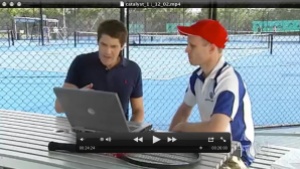 As scientists its not uncommon to have a love /hate relationship with media. Often introverted by nature its daunting to be speaking to the masses, but sooner or later many of us end up doing it. Getting science out to the real world is a great outcome for years of effort in the lab and can turn up new research opportunities and enhance existing ones and makes good common room talk too. In the domain of sport and sports technology not only do we need to be current with the science we (and others) are doing but often its helpful to be able to follow most sports on the planet too, as this is the engaging human interest the reporter often wants to throw to as well.
As scientists its not uncommon to have a love /hate relationship with media. Often introverted by nature its daunting to be speaking to the masses, but sooner or later many of us end up doing it. Getting science out to the real world is a great outcome for years of effort in the lab and can turn up new research opportunities and enhance existing ones and makes good common room talk too. In the domain of sport and sports technology not only do we need to be current with the science we (and others) are doing but often its helpful to be able to follow most sports on the planet too, as this is the engaging human interest the reporter often wants to throw to as well.
Its also useful to be able to communicate in shorter sound bites, or explain complex science in a nutshell. I was fortunate enough to do an ABC Science Media fellowship which helped a quite a bit in this regard, as well as our lab doing a few stories with their science media department on shows like Catalyst (see the stories here – which we are still not brave enough to watch )
At the end of the day (even though after a full day of filming its only going to be 5min story at best), you never know whats going to be left out or in of the print article, left on the cutting room floor of a TV interview and so you just hope for the best. Add to that our culture of peer review which ensures we are very careful about claims we make (often understating what a reporter will what to over state), try to acknowledge colleagues and the shoulders of the giants we stand on. Probably the greatest fear is of making statements that our scientific peers might haunt us with, either minor facts and qualifications on statement’s or for some good natured ribbing from the slip of the tongue (One of my colleagues headline statements was “I’m not a geek but….”, which he is still trying to live down), yet trying to communicate something meaningful. Now try to process all that under the pressure of spontaneous questions during a live 2min television interview and its not surprising we might come out a bit wooden, be reluctant to express opinion or are otherwise sidetracked.
Along the way we might fall into some common traps like:
- Reverting to yes/no answers, as a proverbial ‘deer in the headlights’ (which the interviewer doesn’t want, because they want conversation)
- Coming across as a flake who has no opinion, or worse some being cagey (something akin to a hostile witness with whom the reporter tries harder)
- Trying to be a media personality rather than ourselves
The latter is a particularly poignant cautionary tale as I read the mornings news today and saw a particularly media savvy politician (Barnaby Joyce) try to play the comedian with comedians. It was over a customs issue with an A list celebrity…it was never going to end well, but was a funny read and A for effort Barnaby!
Barnaby Joyce left red-faced during Depp grilling
For the record, I only ever did one interview in which I was being goaded into humour, I apologised immediately “ sorry I don’t do funny”, which apparently was, go figure!